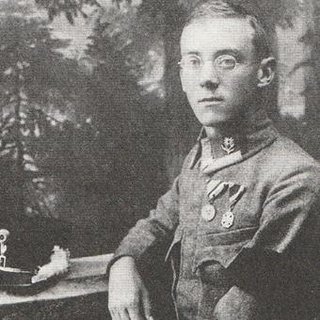Alois Knecht

Personalia
Born:
Died:
Profession:
Persecution:
Imprisonment 10.10.1939 - 27.01.1940,
Sachsenhausen concentration camp in Oranienburg 27.01.1940 - 14.12.1940,
Dachau concentration camp 14.12.1940 - 27.03.1945
KZ Number:
Memberships
Curriculum Vitae
Alois Knecht attended the Jesuit grammar school "Stella Matutina" in Feldkirch. After passing his A-levels, he initially began studying medicine in Innsbruck, but was then drafted into the Imperial and Royal Army at the beginning of the First World War. Army at the beginning of the First World War. Among other things, he fought on the Isonzo and was taken prisoner of war in Italy, from which he was released in 1919. He then began studying theology in Innsbruck and was admitted to the student fraternity Leopoldina Innsbruck in 1919. He completed his studies at the seminary in Brixen and was ordained a priest in 1923. After various activities as a cooperator (chaplain) in Vorarlberg, he was appointed parish priest in Meiningen (district of Feldkirch/Vbg.) in the mid-1930s.
On September 17, 1939, he gave an intrepid sermon based on Psalm 67 verse 13 ("Lord, scatter the nations that want war") and, with the help of papal statements, condemned all those who were always talking about peace but were secretly arming for war. He denounces war as the greatest evil of mankind and quotes Benedict XV, who described the First World War as "the dishonorable slaughter of human beings". After various denunciations, which the Nazi district leader Anton Plankensteiner (1890-1969) personally reported to the Gestapo with the handwritten note "Arrest and prosecution under the Treachery Act", Alois Knecht was arrested after an unsuccessful house search on October 10, 1939 and sent to Bregenz prison because he had "brought unrest to the people through his sermons" and thus violated the pulpit paragraph [§ 130a StGB]. The arrest warrant personally signed by Reinhard Heydrich, head of the SD, contains two further grounds for his arrest: He had thought that "the war is gambled away" and had then offered his radio to his sacristan, remarking, "I will not be lied to for one Reichsmark a month."
On 3 January 1940, he was taken to Innsbruck, where Provicar Carl Lampert was able to visit him once more. Together with 60 other prisoners, he was transferred to the Sachsenhausen concentration camp on January 17, 1940, where the prisoners arrived on January 27 after a 10-day transport. He later met up with Carl Lampert again. From here, together with other Catholic priests, he was transferred to Dachau concentration camp on December 14, 1940, where he remained until March 27, 1945. Karl Leisner was also transferred to Dachau with him and was ordained a priest in the camp chapel. Alois Knecht worked in the so-called plantation, a large herb garden maintained by the SS, where medicinal herbs, spices and vitamin plants were grown: "The Dachau herb garden guarantees the purity, authenticity and cleanliness of the goods" - as it says on the labels. Various appeals for release were unsuccessful - including that of GV Franz Tschann and his brother Fidel, who had hoped to be released through the efforts of the Innsbruck-Feldkirch Apostolic Administration at the district administration. In this letter dated March 29, 1943, he mentions, "since my brother has now been in prison for almost 3 1/2 years, it would no longer be unreasonable to grant an act of mercy and give the old war veteran his freedom."
If you looked through the barred gate into the forecourt of the punishment company, you would always see people there in some embarrassing situation, kneeling, crouching, bent over, or you would see people's bodies rolling in the dirt.
Places
Persecution:
Place of activity:
Citations
hKrause, Peter/Reinelt, Herbert/Schmitt, Helmut (2020): Farbe tragen, Farbe bekennen. Katholische Korporierte in Widerstand und Verfolgung. Teil 2. Kuhl, Manfred (ÖVfStG, Wien) S. 167/168.
